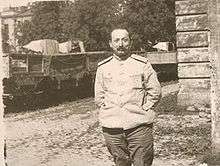Fyodor Dan
Fyodor Ilyich Dan (Russian: Фёдор Ильи́ч Дан; né Gurvitch (Russian: Гу́рвич)), often known in English as Fedor Dan, (19 October 1871 – 22 January 1947) was one of the founding leaders of Menshevism. His wife was fellow Menshevik Lydia Dan.

Background
Fyodor Dan was born to a Jewish family in St. Petersburg.[1] His original surname was Gurvitch. In Deuteronomy 33:22, when Moses blesses the tribes of Israel, the tribe of Dan is described as a "lion's whelp" (גור אריה gur aryeh).
Career
Dan was a lifelong socialist activist and journalist.[1]
Russia
While still a young man, he joined the Union of Struggle for the Emancipation of the Working Class. He was arrested in 1896 and exiled in Oryol for three years.
On his return, he joined the Russian Social Democratic Labour Party and went to London for their Second Congress in 1903. Dan aligned himself with Julius Martov who wanted to have a larger party of activists, rather than Vladimir Lenin's conception of a smaller party of professional revolutionaries. Dan helped Martov form the Mensheviks, returning to Russia in 1912. He was an active member of the irregular freemasonic lodge, the Grand Orient of Russia’s Peoples.[2]
Living in St Petersburg, he edited Menshevik publications until facing exile to Minusinsk following the outbreak of World War I. He was released in 1915 when he agreed to serve in the Army as a surgeon. He returned to St Petersburg following the February Revolution and argued for Menshevik involvement in the Provisional Government. He also argued for continuing the war against Germany and Austria.
In 1917, he was the leading Menshevik on the praesidium of the Petrograd Soviet. He opposed the October Revolution and he was a member of the small oppositional group in the Russian Constituent Assembly. However, this was banned in 1918. Dan continued to denounce the curtailment of political freedoms, linking Bolshevism with Bakuninism.
Exile
Dan was arrested in 1921 and after a year in prison was sent into exile.[1] When the Soviet Union was attacked in 1941, Dan gave his support to the regime. In his book The Origins of Bolshevism (1943) he argued that Bolshevism was the carrier of socialism, whilst still arguing for political liberalisation in the Soviet Union.
Death
Dan left France during the Second World War for refuge in the United States. He died in New York City on January 22, 1947.[1]
Works
- bochīe deputaty v pervoĭ Gosudarstvennoĭ Dumi︠e︡ (1900)
- Sot︠s︡īaldemokratīi︠a︡ i Gosudarstvennai︠a︡ Duma (1906)
- dva goda skitanii (1922)
- Proiskhozhdenie bolʹshevizma; k istorii demokraticheskikh i sot︠s︡ialisticheskikh ideĭ v Rossii posle osvobozhdenii︠a︡ krestʹi︠a︡n (1946)
- Le dictature du proleÌtariat (Paris, EÌditions de la LiberteÌ, 1947)
- Origins of bolshevism [by] Theodore Dan, edited and translated from Russian by Joel Carmichael. Pref. by Leonard Schapiro (1964)
- Ursprung des Bolschewismus; zur Geschichte der demokratischen und sozialistischen Idee in Russland nach der Bauernbefreiung [von] Theodor Dan. [Aus dem Russischen übertragen von Agnes Schwarzschild] (1968)
- Origins of Bolshevism [by] Theodore Dan, edited and translated from the Russian by Joel Carmichael. Pref. by Leonard Schapiro (1970)
- Geschichte der russischen Sozialdemokratie mit J. Martow, uebers. von Alexander Stein, mit e. Nachtr. Die Sozialdemokratie Russlands nach dem Jahre 1908 (1973)
- otobral, snabdil primechanii︠a︡mi i ocherkom politicheskoĭ biografii Dana Boris Sapir (1985)
- dva goda skitaniĭ: vospominanii︠a︡ lidera rossiĭskogo menʹshevizma 1919-1921 (2006)
See also
References
- Jewish Telegraphic Agency. Fyodor Dan, Social Democrat Leader, Dies in New York. JTA Daily News Bulletin, January 23, 1947.
- "Noteworthy members of the Grand Orient of France in Russia and the Supreme Council of the Grand Orient of Russia's People". Grand Lodge of British Columbia and Yukon. 15 October 2017.
External sources
| Wikiquote has quotations related to: Fyodor Dan |